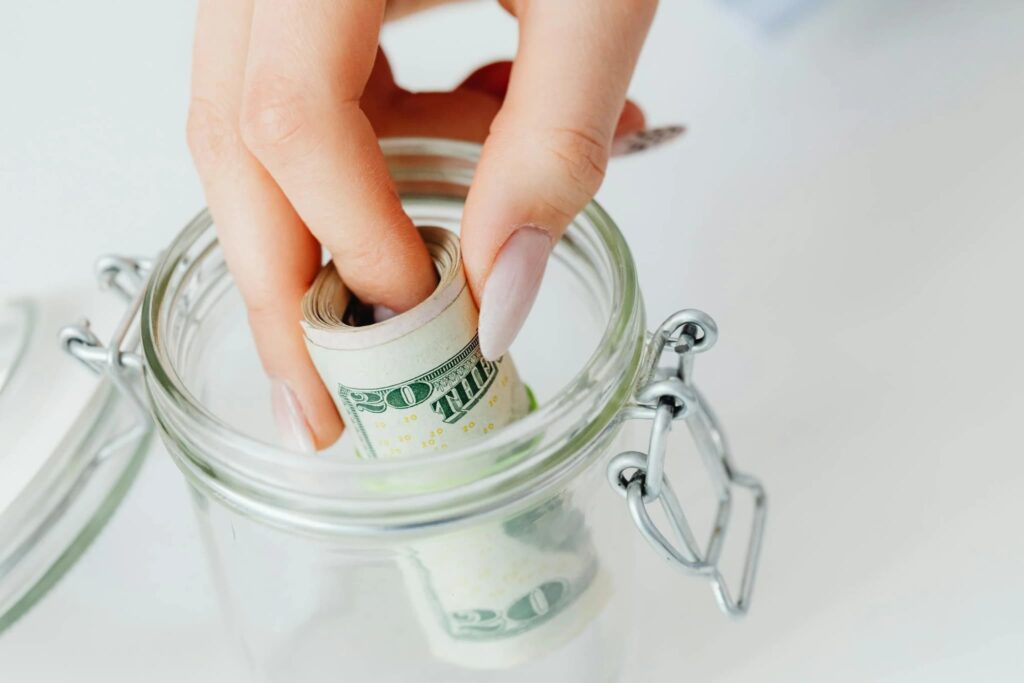When I first started on my frugal journey and heard about Dave Ramsey, I learned about the importance of having an emergency fund. But it seemed impossible. I wasn’t even making it through the month as it was. Still, I realized that without an emergency fund, you’re even more screwed—because emergencies will come up, and if you don’t have something set aside, you’ll end up needing to take out loans or go without whatever your emergency requires—whether that’s medical care, a new washing machine, car repairs, or something else entirely.

So I started small, saving $50 here and there to build a baby emergency fund of $500. Once my finances improved, I increased it to $1,000, and kept growing it from there.
Some kind of emergency fund is imperative. And if you don’t have enough spare money to build even a small one, you’ll be that much less prepared when a real emergency hits. In that case, just do what you can—because anything you manage to save in advance is money you won’t need to borrow later.
Life’s unpredictability can hit hardest when you’re managing a household. Emergencies like unexpected medical bills, job loss, or urgent home repairs can quickly turn into financial strain. That’s why building a family emergency fund isn’t just a good idea—it’s a crucial part of protecting your stability and peace of mind.
Emergencies can happen in an instant. What starts as a normal day can quickly turn into a financial scramble—a sudden car repair, a surprise medical bill, or a loss of income shaking up your entire routine.
These moments can lead to debt, stress, and tough choices without a financial safety net.
A family emergency fund gives you peace of mind. It ensures you won’t need credit cards, high-rate loans, or borrowed money when something goes wrong. It lets your family stay on track financially—even during tough times.
What Exactly Is a Family Emergency Fund?
A family emergency fund is a stash of money to cover urgent, unplanned expenses. The goal is to have funds available quickly to respond to emergencies without disrupting your everyday finances or long-term goals. Typical uses for a family emergency fund include:
- Job loss or income reduction
- Medical bills not covered by insurance
- Major home repairs (like plumbing or roof issues)
- Essential car repairs
- Emergency travel due to family matters
How Much Should You Save?
This is one of the most common questions—and the answer depends on your family’s needs and lifestyle. A general rule of thumb is to save three to six months’ worth of essential living expenses. This includes:
- Rent or mortgage
- Utilities
- Food
- Insurance premiums
- Transportation
- Childcare
- Any other necessary monthly expenses
For example, if your family needs $4,000 monthly to cover the basics, your target emergency fund would range from $12,000 to $24,000. If your household has a single income or less stable employment, you may want to aim for the higher end of that range or even more. On the other hand, dual-income households or those with very stable employment might be comfortable with a smaller buffer.
Tips to Build Your Fund Faster
Trim Everyday Spending
One of the quickest ways to free up money for your emergency fund is to cut back on non-essential expenses. Consider limiting how often you dine out, pause impulse purchases, or review your subscriptions for services you no longer use. Even modest changes in your monthly habits can add up and redirect valuable dollars toward your savings.
Make the Most of Unexpected Cash
It’s tempting to splurge when extra money comes your way—whether from a tax refund, work bonus, or a surprise gift. Instead, consider funneling some of those windfalls into your emergency fund. These one-time boosts can give your savings a noticeable jump without affecting your budget.
Turn Clutter Into Cash
You’ve got items you no longer need around the house. Hosting a garage sale or selling gently used goods online can easily turn clutter into cash. It’s a productive way to declutter your space and pad your emergency savings simultaneously.
Automate Your Contributions
If your employer allows direct deposit, you can make saving effortless by automatically sending a portion of your paycheck straight into your emergency fund. This “set it and forget it” method removes the temptation to spend that money and builds your fund steadily in the background.
The Power of Small Steps
No matter how small, every contribution pushes you closer to your goal. The key is consistency. With each deposit, you build momentum and confidence, knowing your family is better prepared for life’s uncertainties.
When Emergency Loans Are an Option
While having an emergency fund is the ideal way to stay financially prepared, life doesn’t always wait until you’re ready. If a crisis strikes before you’ve saved enough, an emergency loan can offer a quick and accessible solution. These loans are designed to cover urgent, unexpected expenses like medical bills, car repairs, or temporary income loss.
One of the main reasons they’re a good option in emergencies is speed—many lenders can approve and disburse funds within 24 to 48 hours, giving you immediate relief when time is critical.
Emergency loans can have either variable or fixed repayment rates. A fixed-rate ensures that your monthly payments stay consistent, which is helpful for budgeting. A variable rate, on the other hand, may start lower but can fluctuate over time, potentially increasing your repayment amount.
Emergency loans can provide crucial support in a pinch, but they should be used with caution. Carefully review the terms before borrowing, and only take out what you absolutely need. These loans are intended as short-term solutions, not as replacements for establishing a robust emergency fund.
Be Prepared, Always
A family emergency fund isn’t just another financial checklist item—it’s a safety net that provides peace of mind and real protection when needed. Setting clear goals, saving consistently, and choosing the right place to keep your money can prepare your household for life’s unexpected moments.
Start where you are, even if it’s small. Every dollar saved brings you one step closer to financial security. With some planning and discipline, your family can face whatever comes next—confidently and without panic.




